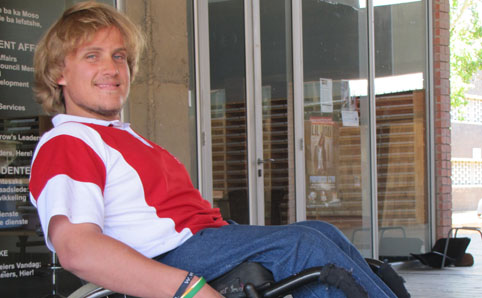|

|
Potential Guinness World Record-holder, Hermann van Heerden
Photo: Phelekwa Mpono |
The Guinness World Record for the longest continuous wheelie in a wheelchair was achieved by Michael Miller of the United States, who covered a distance of 16,12 km on the rear wheels of his wheelchair on 8 August 2009.
On 11 October 2011, Hermann van Heerden, a second-year Kovsie student, will attempt to set a Guinness World Record for the longest wheelie in a wheelchair in a stationary position. The 22-year-old disabled student from the University of the Free State (UFS) will manoeuvre his wheelchair so that the front wheels lift off the ground.
Hermann, who is studying for a BEd degree, was born with spina bifida, a developmental congenital disorder caused by the incomplete closing of the embryonic neural tube. He has been in a wheelchair since he was a toddler.
Hermann’s Guinness World Record attempt forms part of the ten-year celebrations of the Unit for Students with Disabilities (USD) at the UFS. The unit was established in February 2001, with fifteen registered students, but currently supports 143 registered students. The USD focuses on promoting equity for students with disabilities, including access to courses, buildings, learning materials, residences, leisure and sports activities and the opportunity to succeed in such activities.
The unit supports students with specific learning difficulties (dyslexia, attention deficit hyperactivity disorder); mobility–impaired students (wheelchair users and amputees, as well as those suffering from cerebral palsy, muscle dystrophy, spina bifida and multiple sclerosis); visually-impaired students; hearing-impaired students, students suffering from “other” conditions (mental impairment ((schizophrenia)), epilepsy, panic disorder) and those with temporary impairments (broken hand).
Hermann said that he would like to use his record attempt as a means of raising money for the USD and welcomes sponsorships. “The USD has only been good to me ever since I registered at the UFS. Every time I had a question, they answered it. Every time I had a problem with a class, they resolved it. This year, the unit has its ten-year anniversary and I thought it was time for me to give back.”